We all experience inflammation. While some is a normal part of your immune response, ongoing inflammation increases your susceptibility to disease. Good nutrition is one of the best ways to reduce inflammation — and there are plenty of anti-inflammatory foods that can help.
For example, I had a 30-year-old nurse come see me because she was concerned about her elevated heart disease markers and her immediate family history of a fatal heart attack. After working with me closely for just a few months, and increasing the anti-inflammatory characteristics of her diet, she was able to reduce her disease risk significantly.
Let’s dive into why inflammation matters for your heart health and how you can get it under control.
Understanding Inflammation
Inflammation is a localized response to infection or injury in which part of your body becomes swollen, red, hot, and sometimes painful. Consider the last time you got a cut on your skin and the phases of healing that followed. This type of response includes acute inflammation, which subsides when healing is complete.
Chronic (or systemic) inflammation is prolonged and it can affect your whole body system. Left untreated, it increases your susceptibility to heart disease and other issues.
There’s also an important connection between your gut health, heart health, and inflammation. When your gut microbiome is imbalanced, this can trigger a domino effect of inflammation and an increased risk of disease. (More about that in my post The Gut-Heart Axis.)
How do you know if you’re experiencing chronic inflammation? One of the best markers is a blood test called high sensitivity C-reactive protein (hsCRP). CRP is a protein made by your liver that rises with inflammation levels. High sensitivity CRP detects underlying inflammation.
When my client approached me, her hsCRP was 3.2mg/dL, which was high (normal is less than 1.0mg/dL). She had removed pro-inflammatory foods from her diet but it was still elevated. And her BMI and waist circumference were both normal, which is why we cannot use these as the only assessment for underlying inflammation.
Factors like stress, lack of sleep, a sedentary lifestyle, and nutrient-poor foods can contribute to chronic inflammation. That’s why it’s so important to address these through your lifestyle habits, starting with what you’re eating.
What are Anti-Inflammatory Foods?
The best way to reduce inflammation is through lifestyle, particularly nutrition. You have several opportunities each day to fuel your body with foods that help manage inflammation.
Fruits, vegetables, herbs, and other foods contain anti-inflammatory compounds that help fight inflammation. These foods are rich in vitamins and minerals essential for your health, plus antioxidants that protect your cells from stress and damage. Anti-inflammatory foods help reduce inflammatory markers and ultimately, your susceptibility to chronic diseases, heart attacks, and stroke.
The whole of your diet is more impactful than any single food or meal. Do your best to design an anti-inflammatory diet pattern that benefits your health for the long haul. If you need support on your health journey, work with a Registered Dietitian who specializes in heart disease who can create a personalized plan for you.
Foods to Avoid on an Anti-Inflammatory Diet
There are foods that can negatively contribute to optimal heart health. This includes ultra-processed foods, sugary beverages, foods high in saturated and trans fats, and an excessive intake of processed red meats, such as:
- Soda
- Fruit juice
- Energy drinks
- Sugary coffee beverages
- Bacon
- Sausage
- Hot dogs
- Donuts and pastries
- Cookies and cakes
- Packaged snacks made with refined white flour
These foods make up much of the standard Western diet. Not only do they promote inflammation, but they don’t offer much in the way of nutrition. Avoid making them regular players in your diet.
Anti-Inflammatory Foods for Heart Health
What types of foods are best for inflammation and heart disease? Here is a list of certain foods that contribute vitamins, minerals, fiber, antioxidants, and other compounds that can help keep inflammation to a healthy minimum.

- Berries: Blueberries, strawberries, raspberries, and blackberries are rich in antioxidants called anthocyanins, which help reduce the inflammatory response and minimize oxidative damage to cells.
- Fatty fish: Salmon, halibut, mackerel, and tuna are rich in omega-3 fatty acids called EPA and DHA, which help protect cellular membranes from inflammatory damage.
- Nuts and seeds: Enjoy walnuts, cashews, almonds, chia seeds, and ground flax seeds to get a dose of fiber and the omega-3 fat ALA, which is an anti-inflammatory precursor to EPA and DHA.
- Leafy greens: Incorporate spinach, romaine lettuce, arugula, and chard to receive inflammation-fighting compounds like polyphenols, flavonoids, and carotenoids that are especially beneficial for protecting the brain and preventing heart disease.
- Whole grains: Grains like barley, quinoa, oats, millet, and 100% whole wheat bread and pasta are full of fiber, phytochemicals, fatty acids, amino acids, vitamins, and minerals that are likely to play a role in their anti-inflammatory properties.
- Cruciferous vegetables: Broccoli, cauliflower, kale, and Brussels sprouts contain a compound called sulforaphane, which is a potent anti-inflammatory agent.
- Olive oil: Using a small amount of cold pressed, extra virgin olive oil is an easy way to contribute omega-3s to mixed greens or on top of veggies. Olive oil also contains a polyphenol called oleocanthal, which has similar anti-inflammatory properties to ibuprofen. Just note that oil is calorie-dense, and a little bit goes a long way.
- Turmeric and Ginger: Toss these two spices in foods like soups, stir-fries, homemade sauces, and even smoothies for their inflammation-fighting benefits. Pair turmeric with black pepper. The compound piperine in pepper significantly enhances the absorption of the compound curcumin in turmeric.
- Dark chocolate: Consumed in moderation, the cocoa polyphenol compounds in dark chocolate (think 80% cacao or more) have antioxidant and anti-inflammatory properties.
I worked closely with my client to design a personalized health resource guide and meal plan to accommodate her busy schedule as a nurse. We focused on adding in balanced and nutrient sufficient meals to combat her inflammation. After three months of working together, I received an email with the subject line “CRP IS NORMAL!!! THANK YOU!!”
Her hsCRP was 0.4mg/dL, which was an important value to optimize to avoid oxidized LDL from penetrating the arterial wall and leading to plaque formation. In other words, her heart disease risk was significantly decreased. The power of science-based nutrition in action!
Incorporating Anti-Inflammatory Foods into Your Diet
Ready to begin? Here are some practical tips for adding anti-inflammatory foods to your menu.
- Chop, wash, and store mixed greens in your salad spinner in the fridge for the week. All you have to do is grab a handful, add toppings, and enjoy.
- Have a basket of fruit accessible in your kitchen for an easy snack.
- Add leafy greens to soups and smoothies for an anti-inflammatory boost.
- Keep some frozen berries in your freezer for smoothies, muffins, and pancake batters. They last longer this way and are good for any season.
- Make trail mix using dark chocolate chips, pumpkin seeds, sunflower seeds, cashews, walnuts, and dried berries.
Fight Inflammation Now
We all experience inflammation to varying degrees and from different triggers. While acute inflammation is a normal part of your immune response, unmanaged inflammation and heart disease are strongly correlated.
At your next physical, please request an hsCRP blood test to be done. As demonstrated by my client above, it’s important to know your numbers as they can tell you a lot about your heart disease risk factors.
If you’re unsure about other tests for optimal heart health, consider enrolling in my self-paced blood test course. If you are interested in a personalized approach to optimize your cardiovascular risk profile, schedule a 15 minute complimentary discovery call to see if we are a good fit to work together.
References
- Al Bander Z, Nitert MD, Mousa A, Naderpoor N. The Gut Microbiota and Inflammation: An Overview. Int J Environ Res Public Health. 2020;17(20):7618. Published 2020 Oct 19. doi:10.3390/ijerph17207618
- Mattioli R, Francioso A, Mosca L, Silva P. Anthocyanins: A Comprehensive Review of Their Chemical Properties and Health Effects on Cardiovascular and Neurodegenerative Diseases. Molecules. 2020;25(17):3809. Published 2020 Aug 21. doi:10.3390/molecules25173809
- Wierenga KA, Pestka JJ. Omega-3 Fatty Acids And Inflammation – You Are What You Eat!. Front Young Minds. 2021;9:601068. doi:10.3389/frym.2021.601068
- Gunathilake KDPP, Ranaweera KKDS, Rupasinghe HPV. In Vitro Anti-Inflammatory Properties of Selected Green Leafy Vegetables. Biomedicines. 2018;6(4):107. Published 2018 Nov 19. doi:10.3390/biomedicines6040107
- Milesi G, Rangan A, Grafenauer S. Whole Grain Consumption and Inflammatory Markers: A Systematic Literature Review of Randomized Control Trials. Nutrients. 2022;14(2):374. Published 2022 Jan 16. doi:10.3390/nu14020374
- Morris MC, Wang Y, Barnes LL, Bennett DA, Dawson-Hughes B, Booth SL. Nutrients and bioactives in green leafy vegetables and cognitive decline: Prospective study. Neurology. 2018;90(3):e214-e222. doi:10.1212/WNL.0000000000004815
- Ojagbemi A, Okekunle AP, Olowoyo P, et al. Dietary intakes of green leafy vegetables and incidence of cardiovascular diseases. Cardiovasc J Afr. 2021;32(4):215-223. doi:10.5830/CVJA-2021-017
- Mangla B, Javed S, Sultan MH, et al. Sulforaphane: A review of its therapeutic potentials, advances in its nanodelivery, recent patents, and clinical trials. Phytother Res. 2021;35(10):5440-5458. doi:10.1002/ptr.7176
- Lucas L, Russell A, Keast R. Molecular mechanisms of inflammation. Anti-inflammatory benefits of virgin olive oil and the phenolic compound oleocanthal. Curr Pharm Des. 2011;17(8):754-768. doi:10.2174/138161211795428911
- Ballester P, Cerdá B, Arcusa R, Marhuenda J, Yamedjeu K, Zafrilla P. Effect of Ginger on Inflammatory Diseases. Molecules. 2022;27(21):7223. Published 2022 Oct 25. doi:10.3390/molecules27217223
- Hewlings SJ, Kalman DS. Curcumin: A Review of Its Effects on Human Health. Foods. 2017;6(10):92. Published 2017 Oct 22. doi:10.3390/foods6100092
- Samanta S, Sarkar T, Chakraborty R, et al. Dark chocolate: An overview of its biological activity, processing, and fortification approaches. Curr Res Food Sci. 2022;5:1916-1943. Published 2022 Oct 15. doi:10.1016/j.crfs.2022.10.017
